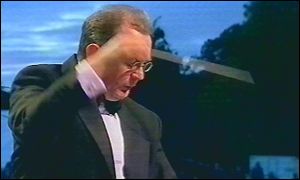
(Matthew 16:13-23)
May these words of this Peter be like a rock,
not a stumbling block!
|
|
"Who do you say
that I am?" Jesus asked. Simon Peter answered, "You
are the Messiah, the Son of the living God." And Jesus
answered, "Blessed are you, Simon son of Jonah! ... You are
Peter (petros), and on this rock (petra)
I will build my church..." Jesus then began to speak of
the rough road ahead. And Peter took him aside and rebuked him... "Get
behind me, Satan!" Jesus replied. "You are a stumbling
block..." (Matthew 16:13-23) May these words of this Peter be like a rock, |
"Yes upon Yes"
Message preached February 23, 2003
Long Green Valley Church of the Brethren
Glen Arm, Maryland USA
based upon 2
Corinthians 1:18-22
A while
back Mitchell complained to me, "Dad, all you ever say to me is Ďno.í
Do you ever say Ďyes?" His que stion
got me thinking about my usual parental posture, and in response I did something
I need to repeat more often. Just he and I had a "Yes night." I didnít
say anything ahead of time, just told him to get in the car and we took off.
"Ask me a question, any question, to which I can either answer Ďyesí or
Ďno,í" I said once were off.
stion
got me thinking about my usual parental posture, and in response I did something
I need to repeat more often. Just he and I had a "Yes night." I didnít
say anything ahead of time, just told him to get in the car and we took off.
"Ask me a question, any question, to which I can either answer Ďyesí or
Ďno,í" I said once were off.
It didnít take him look to catch on. I had in mind a certain movie he wanted to see. When he recognized the theater, he asked, "can we go see it." To which I could loudly say what? "Yes!" It was an evening of "yes" upon "yes." After the movie we stopped (at his request, to which I said what? "Yes!") at Friendlys. When he asked for a certain ice cream concoction there, I said what? "Yes!" I forget some of the other yesís that night, but it was a lot of fun. As I said, itís something I need to repeat more often.
You know - donít you? - that the word "Amen" means, if you strip away all the theological baggage we put on it, simply "Yes!" Sometimes when we say "amen," itís like an echo of a note that sings out deep within us, a sound that rings true, and we know it from the bottom of our heart - a gut reaction, if you will. "Yes!" Itís almost as if we canít help it. This response seems to come from nowhere, and is on our lips - whether or not we actually utter it. The word "response" is important, for this "yes" is in response to something that has been said or done. Like when a word is preached that we know is so very true, or when in prayer something is spoken that we long to emphasize - a request made in which we are leaning on faith totally, or a affirmation of Godís faithfulness that we just have to respond "yes!"
Contrary
to what many people mistakenly believe, "Amen" does not mean "the
end." I have to admit, however, that a prayer ended without an
"Amen" just doesnít feel finished. How about you? Some folks were
disappointed when our new hymnal left out the amens at the end of the hymns,
feeling like these songs just are not really complete without that two or three
note (or even seven-fold) "A-MEN."
The purpose of the "amen" in prayer or praise, however, is not to
bring something to a close. It is to add our "yes!" upon the
"yes!" that we have heard from beyond us. "Praise God from
whom all blessings flow," we sing in doxology. Can we n ot
say "amen," "yes" to that?
ot
say "amen," "yes" to that?
This brings me to something else that is true of an "amen." Often, it is spoken as an affirmation of faith, meaning "this I believe with all my heart, soul, mind, and strength." This morning, two women will stand before us and commit themselves to Christ and his church. Before stepping into the waters of baptism they will give their "Yes!," their "Amen," their "this I believe with all my heart, soul, mind, and strength" in response to certain questions. It wonít be just a matter of words, however. Itís not merely an intellectual exercise, an exam in which they give the right answer to the question. The words they shall speak in response involve deep-seated, action-oriented promise. "I will" or "I do."
These are covenant words. They bind those who speak them, from this day forward, to the One who has first said "Yes!" to them. It is a response to a word already spoken, a promise already fulfilled and yet still remaining to be lived out. Baptism is, in reality, a "yes" upon a "yes." The truth is, every time we respond with an "amen," with our simple (and yet very far-reaching) "yes" upon Godís "yes," we - as believers in and followers of the One in whom, as the apostle Paul wrote, "every one of Godís promises is a Ďyesí" (1 Corinthians 1:20) - are reaffirming our baptismal vows.
Itís not
just about "us," though, and "our" ability to stand tall and
say "yes." If it were, how easily our "yes" would (and does)
shift to "no." When the going gets rough, and we face into places in
life where what we believe is counter to the prevailing mood - when our steps of
faith are costly - the temptation to turn from "yes" to "no"
is great. As I said, our "amen," our "yes" is like an echo
of a sound already in the air, a word already heard, a voice upon which we lean
in all seasons of life ... and death. Without this "yes" of God upon
which our "yes" is based, our promises are like dust in the wind.
Paul wrote the words we heard in this morningís scripture lesson as a response to the doubts of folks in the Corinthian church, a congregation he had an important role in starting. His preaching brought it into being, as he passed along the good news he had received - Godís "yes" in Jesus Christ. His calling from the Lord, however, was as a seed caster. Like a farmer, he tossed the seed of Godís "yesí upon the soil of that city, but others were then called to tend and harvest that seed. Paul then moved on to other places. Even so, he kept up his connection with these people. Evidence of this are (not one, but) two letters we find in our New Testament.
When he left Corinth, Paul promised to return. In the meantime, that seed really grew in the soil of that church. It became a vibrant community of faith. They had their struggles, mind you. They were far from perfect. Having problems in a church, by the way, is not necessarily a bad thing. Sometimes it is a sign that you are alive. A church that is dead doesnít have any problems, does it? Except, that is, the fact that itís dead. Think about that the next time you get frustrated working with people in this body of Christ. When folks say "yes" to the Lord, that doesnít mean they are all singing the same note.
That was
definitely the case in Corinth, where folks werenít exactly even singing in
the same key - if you know what I  mean.
Remember that wonderful chapter on love Paul wrote - "...faith, hope,
love abide, these three - but the greatest of these is love" (1
Corinthians 13:13)? He was like a conductor at that point, tapping on
the music stand with his baton, trying to get this highly gifted orchestra to
play together in the same key.
mean.
Remember that wonderful chapter on love Paul wrote - "...faith, hope,
love abide, these three - but the greatest of these is love" (1
Corinthians 13:13)? He was like a conductor at that point, tapping on
the music stand with his baton, trying to get this highly gifted orchestra to
play together in the same key.
A previous return by Paul was a painful one, for no matter how hard he swung his baton, so to speak, these people continued to play off key. However, as he wrote the words found in todayís scripture lesson, his problem was a long-distant one. He promised to come back again, but other things got in the way. Some folks saw his failure to return as proof of his lack of integrity. Has your integrity ever been challenged? Mine has. "You made a promise you didnít keep," was the charge. "Therefore, you canít be trusted."
Golly, who
can argue with that logic - except to assert that every day all of us fail in
some way to uphold our end of a promise. Is anyone here willing to say
otherwise? ... Weíre human, you and I. All to easily, we fail flat on our
faces. But for the grace of God... Ah, thereís the key. You see, our promise,
our "yes" is based on the "yes," on the prior promises of
God. Our faithfulness depends upon Godís faithfulness. When we fail, as we
will, we depend upon Godís promise to pick us up and get us moving again. We
depend upon Godís forgiveness as we turn to him every day. Indeed, every day w e
relive our baptism. Every day we die to sin and rise with Christ. Every
"yes" we utter - out loud or in our heart, as believers- is an echo of
the crucifixion and resurrection of him in whom "every one of Godís
promises is a Ďyes.í"
e
relive our baptism. Every day we die to sin and rise with Christ. Every
"yes" we utter - out loud or in our heart, as believers- is an echo of
the crucifixion and resurrection of him in whom "every one of Godís
promises is a Ďyes.í"
In writing to the Corinthians who doubted his integrity, Paul simply backed up a step and based his "yes" upon the "yes" of God. "Yes," he said (in effect), "I did promise to return, but my promise depend upon Godís faithfulness. And right now the door to my return to Corinth is closed, even though I promised. Godís Ďyesí apparently is moving in a different direction."
I, as
"Pastor Pete" - not Paul - simply want to say on this wonderful day,
in which we will celebrate the baptism (the "new thing" God is doing
among us right now), that the vows these women will make, their "yes"
as well as our own "amen" is based upon Godís promise, the Lordís
faithfulness, Godís "yes." This is simply "yes upon yes."
Days will come, I am sure, when our "yes" will get stretched, perhaps
even to the point of snapping or breaking. Even Jesus, after he was baptized,
faced forty day of temptation in the wilderness. We follow hi m,
my friends. We are not him. We will fall. Thatís not a promise to which I will
say "amen." Itís just a reality. However, I can say
"amen" to the truth that God picks us up when we fall and grace-fully
gets us back on our feet. Our "yes" does not depend upon us. Our
"yes," today and every day, depends upon Godís "yes."
m,
my friends. We are not him. We will fall. Thatís not a promise to which I will
say "amen." Itís just a reality. However, I can say
"amen" to the truth that God picks us up when we fall and grace-fully
gets us back on our feet. Our "yes" does not depend upon us. Our
"yes," today and every day, depends upon Godís "yes."
As the Paul wrote long ago, "in Jesus Christ every one of Godís promises is a ĎYes.í For this reason it is through him that we say the ĎAmen,í to the glory of God. But it is God who establishes us with you in Christ and has anointed us, by putting his seal on us and giving us his Spirit in our hearts as a first installment" (2 Corinthians 1:20-22). Will you echo those words with your own "amen"?
| online resources for this scripture text |
For commentaries consulted, see 2 Corinthians. |
©2003 Peter L. Haynes